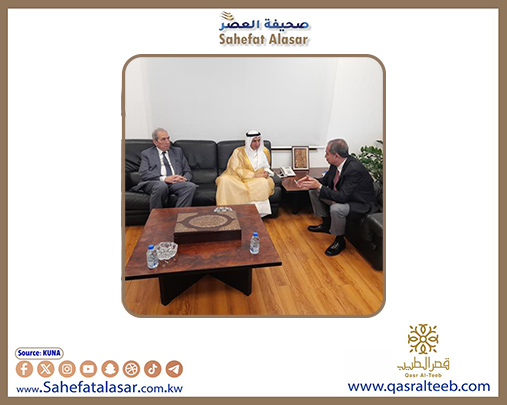


In a statement to Kuwait News Agency (KUNA) following his meeting with Lebanese Energy and Water Minister Joseph Sfeir, Al-Saad said, "Our visit to Lebanon comes to assess some of its developmental needs, especially since we have previous projects that we are working to complete."
He explained that the visit also aims to "evaluate Lebanon's needs for future projects, particularly in water and electricity. We are waiting for the Lebanese government to present its priority projects for our review."
Al-Saad added, "We have informed Lebanese officials that the Arab Fund has a new approach: the Fund will now conduct feasibility studies and finance development projects, with assistance from other funds, to streamline the process."
He noted that project implementation was previously delayed because borrowing countries had to submit loan requests, after which the Fund would ask for preliminary feasibility studies before reviewing them. The Fund has now decided to shorten this timeline by conducting these studies itself and including their cost in the development loan.
Al-Saad emphasized that Lebanon needs numerous development projects, especially after emerging from a devastating war and enduring a difficult economic situation. He stressed that current conditions provide an opportunity to implement these projects.
Lebanese Minister Praises Arab Fund’s Support
In a similar statement to KUNA, Minister Sfeir appreciated the Arab Fund’s continued support for Lebanon, noting its swift response in offering assistance for vital sectors like electricity and water.
Sfeir mentioned that the Fund requested priority projects in both sectors to kickstart work. "One of the top priorities in electricity is rehabilitating and upgrading the power transmission network, while in water, the focus is on wastewater treatment," he said.
Arab Fund Advisor Highlights New Approach
Dr. Mirza Hassan, Senior Advisor at the Arab Fund, told KUNA that Lebanon is "entering a new era with fresh thinking," citing rapid fiscal and legislative steps that inspire hope for a new approach.
"We sensed a new spirit of hope from the Prime Minister and found highly competent ministers in the government," he said, urging Lebanon to seize this opportunity, as it "knows what projects it needs and the challenges it faces."
Hassan confirmed that many of the Fund’s long-standing programs in Lebanon will be completed, with new programs introduced under a streamlined model to accelerate project execution.
"Today, the Arab Fund is telling Lebanon: We will conduct studies, provide financing, bring in funding partners, implement projects, and hand them over—benefiting the state, economy, and citizens," he said.
Recognizing Lebanon’s financial constraints, Hassan added, "We are bringing the private sector to Lebanon, offering them pre-prepared feasibility studies, and assuring investors that the Fund will address any risks or concerns they may have."
High-Level Meetings in Lebanon
During its visit, the AFESD delegation, led by Al-Saad, met with Lebanese President Michel Aoun, Prime Minister Nawaf Salam, Parliament Speaker Nabih Berri, and ministers of finance, energy, water, economy, trade, and administrative development, as well as the Central Bank Governor.
AFESD’s Legacy in Lebanon
In recent years, the Arab Fund has financed major infrastructure projects in Lebanon, along with initiatives in education, public services, and socio-economic development. Notable projects include the Litani River Water Transfer Project, which supported the reclamation of 15,000 hectares of land, and the Lebanese University campus development, housing 12 faculties.
About AFESD
Headquartered in Kuwait, the Arab Fund for Economic and Social Development is a regional Arab financial institution focused on financing economic and social development through public and private investment projects, grants, and technical expertise.
